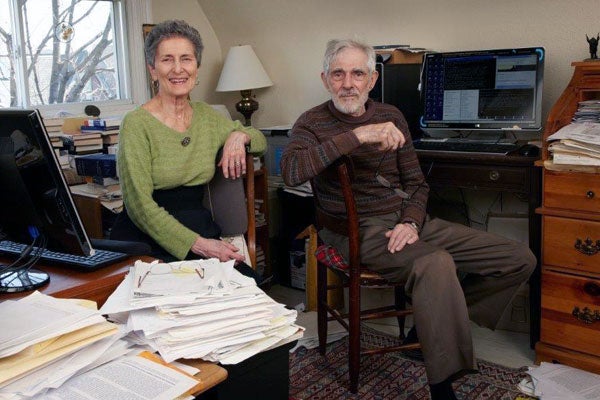
Chandler Davis on science and social justice: “break some rules”
Published: May 4, 2015
University of Toronto Professor Emeritus Chandler Davis, imprisoned during the McCarthy Era in the United States for his political actions, delivered the third Dr. Zofia Pakula Public Lecture April 27, 2015 at U of T – and urged his audience to be advocates for change.
“Scientists, like physicians, should be bound to the mantra that science should first do no harm,” Davis told the crowd of more than 150 students, faculty, staff and community members.
Davis came from what he calls a radical family and is a former member of the Communist Party of America. He refused to cooperate with the House Un-American Activities Committee and was dismissed from the University of Michigan.
Before the courts, he declined to invoke the Fifth Amendment protection against self-incrimination. Instead, he chose to stand up for his belief in the First Amendment right to free speech, a radical approach that landed him in prison for six months.
A few years later, Davis and his wife, renowned U of T historian Natalie Zemon Davis, moved to Canada. While a professor at U of T's department of mathematics, Chandler pursued a life-long agenda of working for Science for Peace and other activist groups that used a scientific and humanist perspective to advocate for peace and social justice.
“If what you are doing seems safe and sane, you are doing something wrong,” Davis told the audience. “You must break some rules.”
The Pakula lecture series is hosted by the Institute for Global Health Equity and Innovation (IGHEI), housed at the Dalla Lana School of Public Health. The series is dedicated to the belief that war is anathema to well-being. It celebrates lively discussion on global public health, human rights and the complex, multidimensional interrelationships of health and war and health and peace in an effort to “Wage Peace.”
“One mandate of the Institute is to provide a safe space to ask ‘unaskable’ questions and encourage discussion on taboo subjects, differences in opinion and robust dialogue,” said Professor Alex Jadad, IGHEI director, underscoring his belief that U of T is a place for respectful free speech.
Davis was joined in conversation with Professor Howard Hu, dean of the Dalla Lana School of Public Health. Hu is a physician-academic who has been involved in numerous human rights missions on the effects of toxic exposures to civilian populations in conflict situations.
Davis and Hu agreed that impacts on biological ecosystems of the mining, oil and forestry industries comprise a relatively unexamined area that is fraught with issues pertaining to corporate interests and objectivity.
“Even less understood are those related to marginalized populations affected by such extractive industries because such research is costly, typically occurs in polarized communities and trust isn’t easily built,” said Hu, a founding board member of Physicians for Human Rights and former director of the Research Commission for the International Physicians for the Prevention of Nuclear War on the health effects of atomic weapon production.
“I am a firm believer that science must serve social needs and address inequality,” Hu said.
The Pakula lecture series is sponsored by a generous endowment by Dr. Pakula’s son, Andrew, in memory of his mother, a courageous Holocaust survivor and a compassionate physician. Pakula lecturers have included Professor Emerita Ursula Franklin and James Orbinski, a professor in global health at the University of Waterloo.
Nicole Bodnar is a writer with the Dalla Lana School of Public Health at the University of Toronto.



